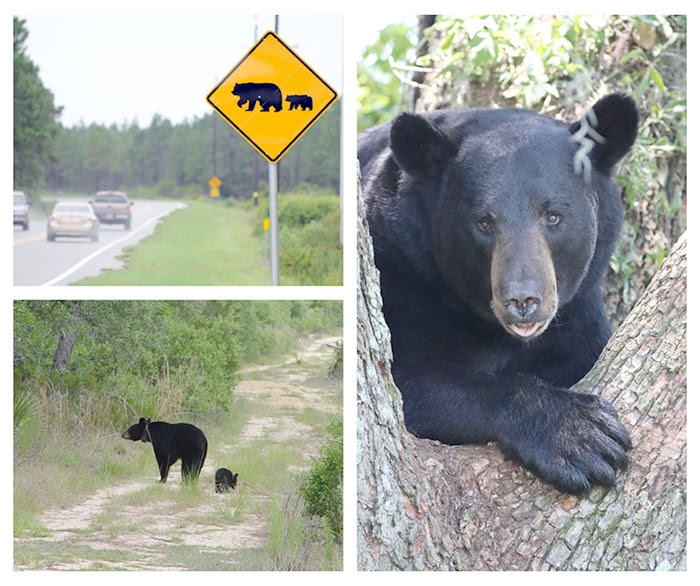What to do if your find a bear in an unexpected place
Florida Fish and Wildlife Conservation Commission (FWC)
The Florida Fish and Wildlife Conservation Commission (FWC) is sharing its annual reminder that juvenile black bears might be seen in unexpected areas as they leave their mothers’ home ranges in search of new locations of their own to settle down. Spring also marks a general increase in activity for bears after limited movements in winter.
“Juvenile or yearling bears – between the ages of one-and-a-half and two-and-a-half – start dispersing in spring and summer each year,” said Mike Orlando, FWC Bear Management Program Coordinator. “The best thing people can do, if they see a bear in an unexpected area, is to give them plenty of space and to never approach or feed them, and they will typically move along, on their own.”
During this time of year, black bear sightings increase in suburban and urban areas, including larger cities around the state. Seeing a bear in a neighborhood is not necessarily cause for alarm. However, it is important that people secure food attractants so that bears do not linger in the area. Generally, if a bear is not able to find food and is given space, it will move on. Feeding bears can make them lose their natural fear of people. It is also illegal in Florida to intentionally feed bears or leave out food or garbage that will attract bears.
Black bears are not generally aggressive, but like any wild animal, can become defensive if they feel threatened. Dogs have been involved in over half of the incidents of people being injured by bears in Florida. When walking dogs, keep them close to you, ideally on a non-retractable leash, and be aware of your surroundings, which is good practice for preventing conflicts with any wildlife. Before letting your dog out in your yard at night, flip the lights on and off, and bang on the door, to give bears and other wildlife a chance to leave the area before you venture outside.
As bears become more active this time of year, they cross more roadways. For your own safety and to avoid hitting bears and other wildlife, remember to slow down when driving, particularly on rural highways at dawn or dusk. Watch for road signs identifying bear crossing areas. Each year in Florida, an average of 300 bears are killed after being hit by vehicles.
If you have bears in your area, follow these additional BearWise® tips to help prevent conflicts with bears:
Secure Food and Garbage
• Store garbage in a sturdy shed or garage and then put it out on the morning of pickup rather than the night before.
• If not stored in a secured building, modify your existing garbage can to make it more bear-resistant or use a bear-resistant container.
• Secure commercial garbage in bear-resistant dumpsters.
• Protect gardens, beehives, compost and livestock with electric fencing.
• Pick ripe fruit from trees and bushes and remove fallen fruit from the ground.
• Remove or secure bird and wildlife feeders.
Remove Wildlife Feeders
• If wildlife feeders are left up, only put enough food out for wildlife to finish eating before dark and make feeders bear-resistant.
• Never leave pet food outdoors.
Feed Pets Indoors
• If feeding pets outdoors, only put food outside for short time periods and bring in leftover food and dishes after each feeding.
Clean and Store Grills
• Clean and degrease grills and smokers after each use.
• If mobile, store them in a secure shed or garage.
Alert Neighbors to Bear Activity
• If you see a bear, let your neighbors know.
• Share tips on how to avoid conflicts with bears.
• Encourage your homeowner’s association or local government to institute bylaws or ordinances to require trash be kept secure.
What to Do if You're Having Conflicts with Bears
FWC staff members are here to help. Call the FWC regional office closest to you. Find the phone number for your region here: MyFWC.com/contact/fwc-office/regional-offices.
If you spot an injured, orphaned or dead bear, feel threatened by a bear, or to report someone who is either harming bears or intentionally feeding them, call the FWC Wildlife Alert Hotline at 888-404-FWCC (3922).
More information is available at MyFWC.com/Bear, where you can access the “Guide to Living in Bear Country” brochure.
Find additional ways to be BearWise at BearWise.org. Thirty-nine states, including Florida, support BearWise®, an innovative program that helps people learn ways to responsibly live around bears.
Help the FWC help bears and other wildlife by purchasing the Conserve Wildlife license plate at WildlifeFlorida.org/CWT.
